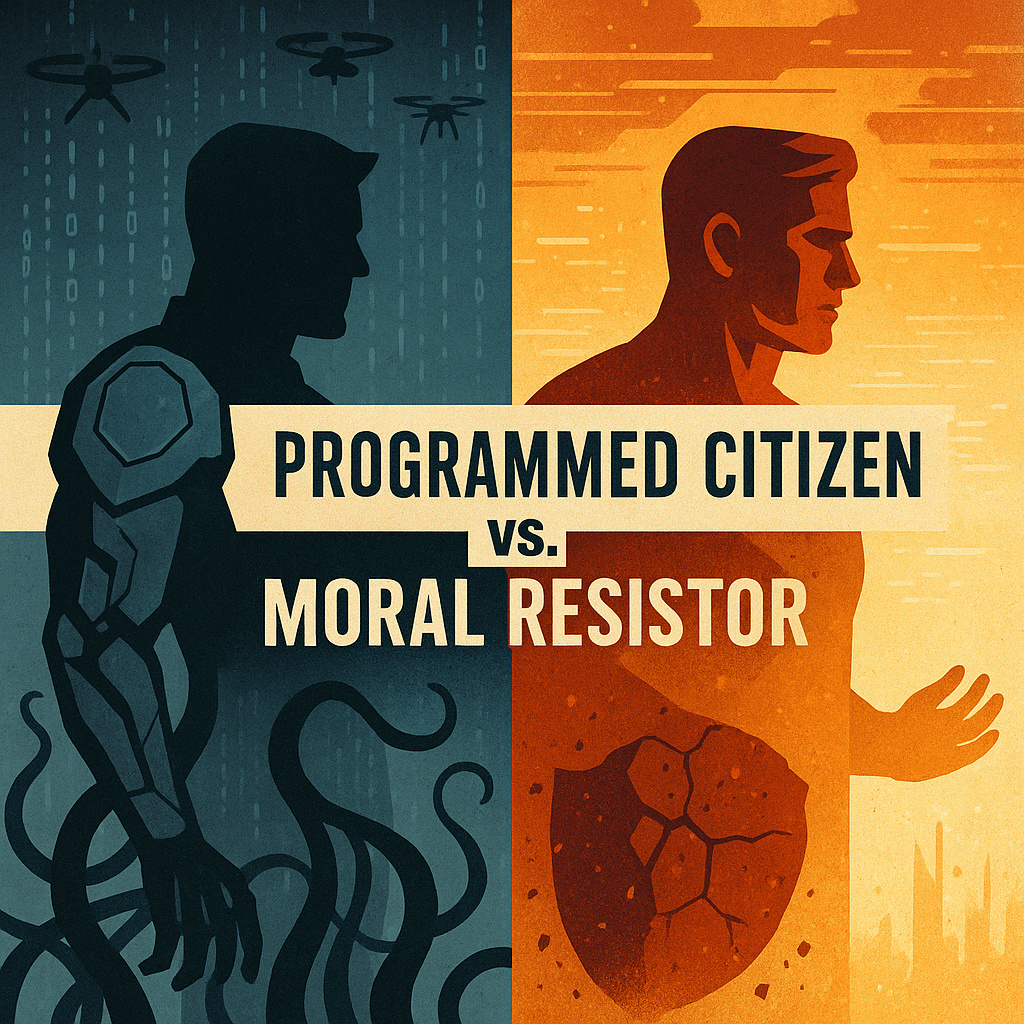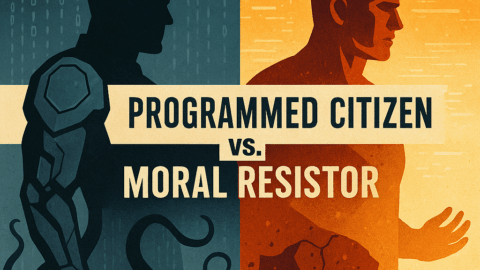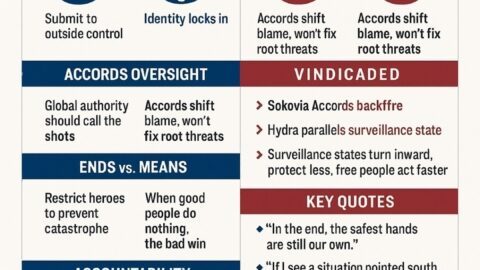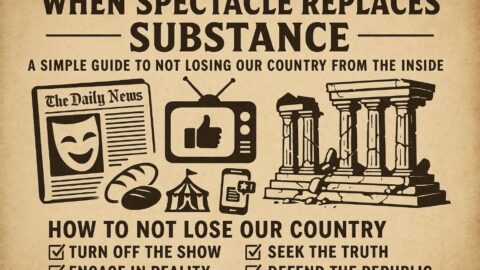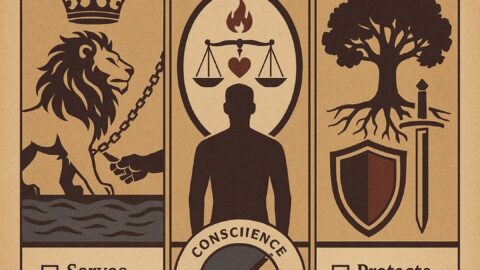When institutions forget their purpose, they program people to obey. Freedom survives only where conscience outranks code. In The Winter Soldier, Bucky Barnes and Steve Rogers give us the two paths: become the system’s instrument or become its conscience.
The Programmed Citizen (Bucky Barnes)
Bucky isn’t born a villain; he’s repurposed. HYDRA wipes his memory, installs triggers, and points him like a weapon. That’s the blueprint of authoritarian power: erase identity, rewrite loyalty, reward obedience.
Defining traits
- Conditioned compliance: “Ready to comply.”
- Fragmented memory: truth reduced to flashes; the past can’t anchor the present.
- External triggers: a handful of words hijack agency.
- Strength without compass: power divorced from principle.
What Bucky represents today
- Incentive systems that train us to trade privacy for convenience, truth for tribe, character for clout.
- Algorithmic nudges that predict—and then prescribe—our choices.
- Bureaucratic scripts that say: “Don’t ask. Don’t think. Execute.”
Cost
Programming feels efficient—until it empties the self. When identity collapses into instruction, citizens become tools. Tools don’t debate ends; they just optimize means.
The Moral Resistor (Steve Rogers)
Steve doesn’t have better tech; he has a better north. He’s not loyal to logos or uniforms but to first principles. That’s why he can stand against the very institutions that once empowered him.
Defining traits
- Conscience before compliance: “I can do this all day.”
- Loyalty to mission over brand: people and principles, not PR.
- Courage under isolation: the strength to be the first dissenting vote.
- Mercy with resolve: refuses to kill Bucky because he sees the man beneath the programming—“I’m with you to the end of the line.”
What Steve represents today
- The citizen who reads before reposting, asks before obeying, and demands due process over “trust us.”
- The leader who burns reputational capital to defend the unpopular truth.
- The neighbor who remembers that freedom is a duty before it is a right.
The System: HYDRA’s Blueprint for “Safety”
Project Insight sells peace; it delivers pre-crime tyranny. HYDRA doesn’t overthrow S.H.I.E.L.D.—it becomes S.H.I.E.L.D., proving the most durable authoritarian move is infiltration, not invasion.
Playbook
- Capture the architecture: keep the badge; change the mission.
- Rebrand control as care: “We’ll keep you safe.” (From whom? From you.)
- Automate judgment: let algorithms decide who counts as a threat.
- Scale enforcement: make suppression instant, invisible, irreversible.
Historical echo
Authoritarian regimes always claim necessity—emergency powers, internal enemies, “temporary” measures. HYDRA’s creed is perennial: dominate through protection.
Why Steve Burns It Down
Reform presumes a healthy center. But when secrecy, capture, and preemption are the core design, patching is compliance theater. Steve exposes the whole apparatus because he knows architecture beats intention. Good people cannot redeem a bad system built to outlive them.
Principle: If a tool can be abused, it will be—so design with the worst future hands in mind, not the best present ones.
The Choice in Us
Every age offers these roles.
Live as Bucky
- Outsource thinking to tribe, authority, or feed.
- Trade clarity for scripts, courage for comfort.
- Become efficient—and empty.
Live as Steve
- Keep a tested moral map (truthfulness, restraint, duty to the vulnerable).
- Question power especially when it flatters your side.
- Accept cost: freedom has a price; so does silence.
Practical Guardrails (So We Don’t Build Project Insight at Home)
- Sunset every emergency. No auto-renew. Expire by default.
- Independent audits. External, adversarial, and public.
- Due process > pre-crime. No punishment without transparent evidence and challenge rights.
- Minimize and decentralize data. Collect less, keep it local, delete early.
- Separation of powers in code. Split keys, multiparty approvals, public logs.
- Plain-language transparency. If citizens can’t read it, it’s not oversight.
- Whistleblower shields. Protect the Steves before you need them.
Tests You Can Run Tomorrow
- The Worst-Hands Test: “What could the most corrupt actor do with this tool?” If the answer is “a lot,” redesign or refuse.
- The Flip Test: “Would I defend this power if my opponents held it?” If not, you don’t want a law; you want a loophole.
- The Bucky Test: “Does this policy require citizens to obey before they understand?” If yes, it’s programming.
The Human Center: Saving What’s Left of Bucky
The miracle in The Winter Soldier isn’t the explosion; it’s recognition. Steve calls Bucky by name. Authoritarianism thrives by turning persons into profiles; resistance begins by re-personalizing the programmed—restoring memory, story, responsibility, and belonging.
Translation for us
- Refuse to reduce people to labels or risk scores.
- Create communities that practice truth and mercy: firm lines, open doors.
- Replace spectacle with substance: fewer slogans, more service.
Conclusion
HYDRA’s methodology didn’t die with the Red Skull. It migrates to every age willing to trade liberty for the theater of safety. Bucky shows what we become when we surrender conscience to code. Steve shows what it costs to stay human.
Freedom is not the absence of danger—it’s the presence of conscience.
When the system says, “Ready to comply,” the future belongs to those who answer,
“I can do this all day.”

